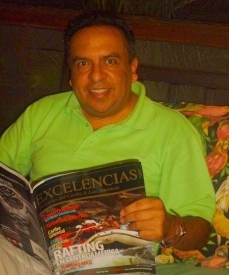Guillermo Ortiz, co-owner of Pachira Group (based in Tortuguero, Costa Rica)

Guillermo Ortiz, co-owner of Pachira Group (based in Tortuguero, Costa Rica)
Pachira Group offers in Costa Rica a mostly ecological destination, options of excellence accommodation and tourism which have already reaped commercial success in demanding markets from North America and Europe. Excelencias Group interviewed Mr. Ortiz at Pachira Lodge Hotel and listened about the characteristics of the group’s properties, the environment around them and tourism offers.
Would you mind telling us a little about the hotel?
The idea of opening a new accommodation option in the area of Tortuguero came up 16 years ago, as it’s one of the most important national parks in the country due to its wealth in terms of wildlife, so we bought a piece of land in order to develop a concept different from what already existed in the zone.
We opened the Pachira Lodge hotel with 12 rooms. The name is the scientific denomination of a tree that grows near the channels, requires a lot of water and its exotic flowers are amazing. This name has gained momentum in the country due to its exotic nature.
We currently count on 88 rooms distributed on a 14-hectare area, the rooms and common areas including restaurants, swimming pool and the reception desk are placed on one hectare and half of which; so the rest of the property is a totally virgin zone that features a 1 km-long path for customers to enjoy. We won’t build more rooms in that area so we can deliver guests a customized and exclusive service.
You told us there are three hotels in the same area…
As a result of the demand registered after we inaugurated this first hotel, we had to open a new one, eight years ago, named Evergreen Lodge that presently possesses 62 rooms. Featuring a concept similar to the first one, in this case it’s all about small bungalows in the jungle. The property covers 16 hectares and counts on all the comfort offered by the different alternatives of Pachira Group.
Aninga Lodge is the third hotel. The name comes from Anhinga Anhinga, scientific name of a bird. This hotel was a response to the huge demand we received from the North American market, which required a number of rooms that couldn’t be offered by any of the already existing hotels.
Aninga Lodge counts on 32 small and independent rooms, also located in the middle of the jungle. Every hotel is run by different managers, but all of them provide the same excellence services delivered by the rest of the Group.
As we possessed those three hotels and counted on our own canopy and our own spa, we decided to join as Pachira Group, made up of three hotels.
How many owners?
Pachira is owned by four Costa Rican owners, as well as the rest of Tortugueros area where most of the owners are locals, but it isn’t so in other places.
During these 16 years, what has been the strongest market?
Our market is similar to Costa Rica’s, which is made up of 55 percent of tourists coming from the US and Canada. Almost the 40 percent of the rest arrives in from Europe and 10 percent from other countries. The market behavior for Pachira Group responds to the same pattern detected in the rest of the country.
Do Costa Ricans also visit you?
Part of our philosophy affirms that Costa Ricans should visit this part of the country, which is off the beaten track because there is no road. You can only have access to Tortuguero national park by air or water, so Costa Ricans are not accustomed to visiting this area, but as part of our philosophy so as to educate the national market, we offer special fares with 30 or 40percent discounts if compared to those stated for foreigners, as an effort to encourage Costa Ricans to visit our hotels.
How many tourists do you annually welcome and what are the main periods?
Just at Pachira Lodge, we welcome some 23,000 tourist a year and the three hotels sum up a 35,000 annual average.
We have two specific peak seasons: December to March that is a high season for the entire country, during the winter in the northern hemisphere; and the other one is not only defined by the attractive park and its channels, but by the green turtle spawn, scientifically named Quelonia midas, as this is the most important spawn zone in the western hemisphere.
This spawn period includes from July to October, when we’re visited by tourists from all over the world looking forward to watching the spawn process at Tortuguero beach.
Do the tourists that visit you travel alone, with their families, couples? Do they buy packages?
98percentof our sales are carried out by local Costa Rican operators, inbound travel agencies. Our internet agencies represent 1 percent and the other 1percent goes for wholesaler operators abroad.
We welcome many families. This isn’t a destination for children under four years old, because they can’t enjoy the wildlife in the area.
Tortuguero isn’t a beach destination because our beaches in the Caribbean are part of Limon harbor to the south. There are spectacular beaches, but our main element is wildlife, which means a totally ecologic tourism.
What do the tourism packages you offer consist of?
We offer two important options. We have daily departures from San Jose all over the year and there is no limit in terms of the amount of visitors. We count on our own buses and boats and our own restaurant on the route, so we absolutely control product quality.
We provide a two-day-and-one-night package for visitors who are shy of time or budget. However, our star package is the one including three days and two nights with fluvial and land transportation from San Jose, two accommodation nights, all the meals during the three days, bilingual guide (Spanish-English) during the entire tour and three guided visits: hike through the path next to the hotel, which as I previously said is 1 km long; visit to the picturesque Tortuguero town, a five-minute sail from our hotel and visit to the wonderful channels of Tortuguero within the national park.
We saw that there are classified trash cans around the hotel. Do you promote wastes recycling?
Costa Rica follows a program implemented by the Ministry of Tourism called STC or Sustainability Tourism Certificate that encourages us to work on the behalf of nature under a project of touristic sustainability.
This project not only includes wastes recycling –which is executed in our hotels–, but the collaboration of the community. At the hotel we recycle wastes such as plastic, glass or organic wastes. There is a collecting center in Tortuguero and that is where we send our garbage, to get it recycled and shipped to countries such as China where it’s processed to created new products.
This project was designed to be managed by single mothers or householders, but it’s actually a mixed project.
Do you also reuse the water?
We’re committed to avoid the pollution and that’s the reason why we get our waters treated with different recycling systems, so they don’t pollute rivers or channels that are our main income source.
I know that this isn’t the first time that you work with Meiers. Why do you think they chose you as hosts?
We believe that we provide an excellence service to fulfill customers’ expectations of satisfaction. We perfectly know what the German market looks for, its tastes and preferences. Since we inaugurated the hotel, we’ve worked with Meiers through its local operator in Costa Rica and our business relation has been extremely successful.
What has been the impact of working with Meiers and Costa Rica for All?
Costa Rica for All is one of the agencies that have maintained permanent ties with us since our opening. They started their operation with us and it has remained so for 16 years, in a constant, loyal and exclusive way with Pachira Group’s hotels.
What would you recommend not only to the German tourist but to the overall market during their visits to Costa Rica?
Costa Rica is an ecologic destination with beach as complement in the south Caribbean and the Pacific. It’s not a beach destination as such. Though it’s small, the country offers many touristic attractions and visitors can travel from one site to other depending on their preferences and budget.














